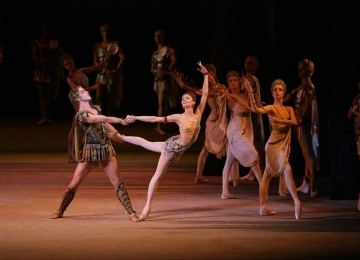Aram Khachaturyan "Spartacus". (Ballet in 3 acts)
Premiere of this production: 09 Apr 1968 Running time: 3 hours 10 minutes Libretto by Yuri Grigorovich after the novel of the same name by Raffaello Giovagnolli, ideas from the scenario by Nikolai Volkov used Presented with two intervals. Act I Scene 1 Spartacus’c Monologue. Scene 2 Phrygia’s Monologue. Scene 3 Spartacus’c Monologue. Scene 4 Act II Scene 5 Spartacus’s Monologue. Scene 6 Aegina’s Monologue. Aegina has long dreamed of seducing and gaining power over Crassus. Her goal is to win him and thereby gain legal admittance to the world of the Roman nobility. Scene 7 Spartacus’s Monologue. Scene 8 Act III Scene 9 Aegina’s Monologue. Spartacus is Aegina’s enemy too. The defeat of Crassus will be her downfall. Aegina devises a perfidious plan - she will sew dissension in Spartacus’s encampment. Scene 10 Scene 11 Spartacus’s Monologue. Scene 12 Requiem. Additional information"Sara Kaufman, The Washington Post - review of the "Spartacus" by Bolshoi Ballet." I bring up Vasiliev's age because I could hardly believe that the virile, seething Spartacus who unleashed a cauldron of emotion Tuesday at the Kennedy Center was the same young whiz who thrilled the crowd on pyrotechnics alone in 2007. It's rare to see such a young dancer labor over the dramatic dimensions of a role when simply getting the physical demands under control is a hefty task. But Vasiliev demonstrated, movingly, that he has ambitions beyond being the troupe's go-to dynamo. Vasiliev is also slated to dance Thursday night and Sunday afternoon. But this ballet does not rest entirely on the efforts of its star. Four leading dancers bear nearly equal importance to the plot. In addition to Spartacus, the Thracian captive who whips up a revolt, there is his Roman nemesis and captor Crassus (on Tuesday, the noble-looking but wonderfully decadent Alexander Volchkov); Crassus's black-hearted concubine Aegina (cruel charmer Maria Allash), and Spartacus's teary wife Phrygia, also enslaved (Nina Kaptsova, lovely but not as earthbound as the others -- she seemed to have joined them from a colony of water nymphs). As impressive as they were individually, Vasiliev and Kaptsova were not a physically well-matched pair, however; he is a smallish dancer, she is long-stemmed, and he lifted her with more than a trace of effort. No matter the casting -- ballet lovers, Russophiles and fans of the bright, unsubtle pageantry in Aram Khachaturian's music would do well to catch any performance before the run closes on Sunday. It's been 35 years since the Bolshoi last brought "Spartacus" to the Opera House, an absurdly long time to go without its miniskirted Roman soldiers forming cheerleader pyramids with their spears and shields. Those who remember it say that back then there was a lot more scenery-chewing. I wouldn't know, but the current production strikes an effective balance between juicy melodrama -- not too schmaltzy, not too dry -- and gold-standard ballet finesse to curl your toes. It's the quintessential Bolshoi ballet, what one company representative described to me as their " 'Swan Lake' of the 20th century." Former Bolshoi director Yuri Grigorovich created it in 1968, one of the earliest of his many ballets and remarkable, at the time, for its spare, rugged decor, grandiosity of feeling and fluid pacing. Those attributes still set it apart. The elements of Hollywood camp -- heavy eye makeup for all, bangles for the Romans -- are just fun: You half-expect Elizabeth Taylor and Richard Burton to stroll on. The ancient world meets the Sputnik age here -- bare stone walls, stylized costumes that suggest togas and armor. It's a fitting frame for the linear neoclassical ballet style that Grigorovich deploys so well. At times the women, especially, seem to have jumped off a Grecian urn -- or stepped out of a Balanchine ballet. Yet while much of the ballet technique is modernized and streamlined, something you rarely see in a full-length story ballet, the dancers still deliver that bighearted Bolshoi expressiveness. The result is a work with a fresh, sharp edge as well as a dramatic and emotional punch. The decor also allows for plenty of open space for clashing testosterone. The ballet launches with a crisscrossing melee of high-kicking sword-bearers -- Roman Rockettes, if you will. With Grigorovich's clever traffic management, you can believe the interweaving lines of male dancers represent legions of warriors. He's just as adept at crafting sweeping solos, and each leading dancer has ample opportunity to establish character and state of mind. Groups, too, have their own style. The Romans dance differently from the gladiators; they are blockier, more formal, while the enslaved killers move in a gutsier, freer way. Grigorovich left the Bolshoi in 1995 but returned to oversee his ballets two years ago, after the death of his wife, the former ballerina Natalia Bessmertnova. Now 83, crowned with thick white hair, he was in the audience Tuesday and joined the dancers onstage for a flood of applause. Ballet manners are always lovely to see, and in a show of the best of them, during his own standing ovation Vasiliev stepped back to clap for the rest of the cast, and then saluted conductor Pavel Sorokin and the orchestra. Their vivid account of the Khachaturian score helped power the ballet through a mightily entertaining three hours. "Spartacus," you hold me captive. | |||||


